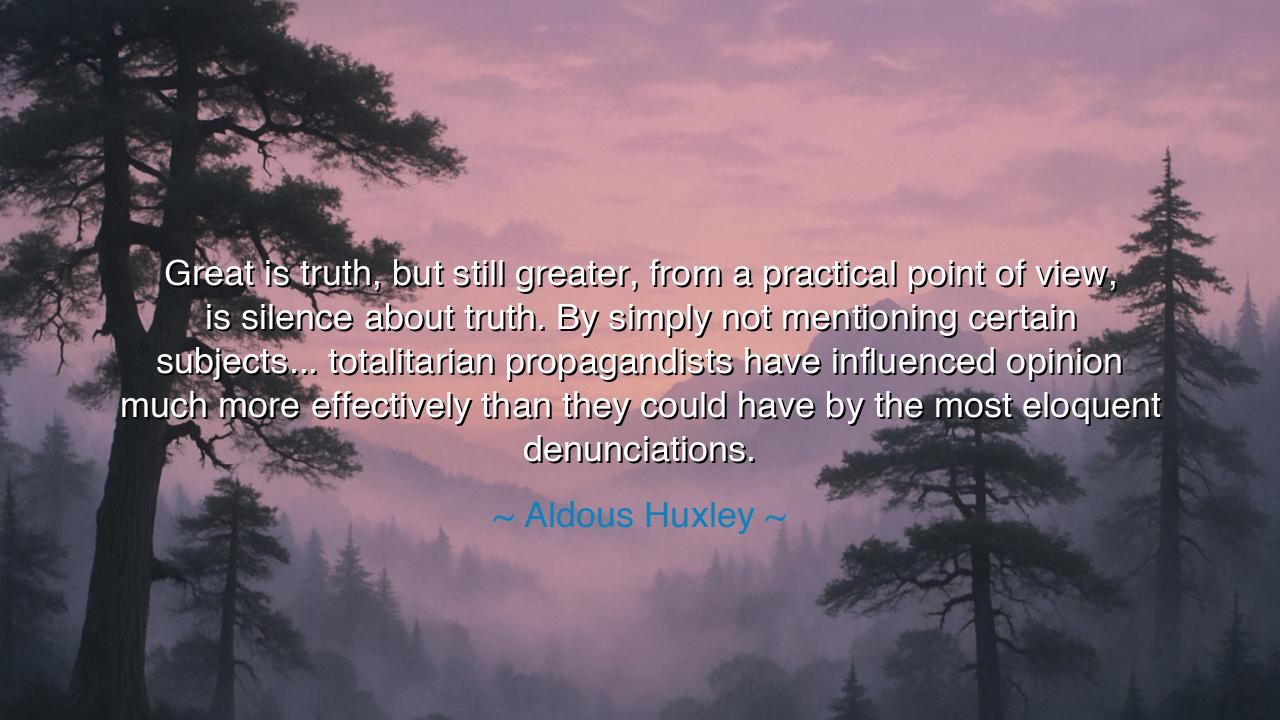
Great is truth, but still greater, from a practical point of
Great is truth, but still greater, from a practical point of view, is silence about truth. By simply not mentioning certain subjects... totalitarian propagandists have influenced opinion much more effectively than they could have by the most eloquent denunciations.






In the long struggle between freedom and control, the philosopher and visionary Aldous Huxley once wrote with chilling precision: “Great is truth, but still greater, from a practical point of view, is silence about truth. By simply not mentioning certain subjects... totalitarian propagandists have influenced opinion much more effectively than they could have by the most eloquent denunciations.” These words, born from the mind that foresaw Brave New World, are not a lament of the past, but a warning for all ages. Huxley, who peered into the machinery of power and illusion, teaches us here that truth’s greatest enemy is not the lie, but the silence that buries it.
From the dawn of civilization, the wise have understood that truth is a light, fragile yet eternal. It can be distorted, it can be dimmed, but only silence can make it disappear entirely. For lies, when shouted, still call forth opposition; they awaken doubt, and doubt awakens inquiry. But silence — that cunning void — lulls the mind to sleep. It requires no persuasion, no debate, no resistance. The silence of truth is a stillness that corrodes from within, leaving societies blind not by deception, but by omission. Thus, Huxley saw with prophetic eyes that tyranny need not always roar — sometimes it whispers nothing at all.
Consider the fate of the Library of Alexandria, that shining beacon of ancient wisdom. When its scrolls were burned and its scholars scattered, the conquerors did not need to falsify history; they merely erased it. The silence that followed — the silence of lost knowledge — was more devastating than any lie. For centuries, the truths of science, philosophy, and art were forgotten, and humanity wandered in darkness. This is the silence that Huxley warns against: the silence that allows truth to vanish not by argument, but by neglect, until generations forget that it ever existed.
In modern times, this silence takes subtler forms. Propaganda need not always shout slogans or raise banners; it can simply choose what not to show, what not to say. By omitting certain facts, by never naming certain injustices, the powerful mold reality itself. People come to believe that what is not spoken does not exist. The philosopher Hannah Arendt, who chronicled the rise of totalitarianism, called this “the banality of evil” — a quiet, bureaucratic forgetting. Through selective silence, tyrants shape the thoughts of free men without ever lifting a sword. It is not fire and chains that bind the mind, but the absence of truth.
Huxley, who lived through two world wars and watched the birth of mass media, understood how silence could be weaponized. In his vision, the danger was not that people would be forced to believe lies, but that they would be drowned in pleasure, distraction, and half-truths until they no longer cared to seek the real. “The greatest triumph of propaganda,” he implied, “is indifference.” When truth becomes too quiet to notice, when comfort replaces curiosity, a people lose not just their knowledge — they lose their freedom to think.
And yet, his words are not a call to despair, but to vigilance. The antidote to silence is speech, the fearless act of naming what others dare not name. Each age has its witnesses — those who refuse to let truth be buried. When Galileo stood before the Inquisition and murmured, “E pur si muove” — “And yet it moves” — he broke that silence with a whisper that outlasted centuries of fear. When voices rise to tell the truth — whether in courts, in classrooms, or in the quiet rebellion of honest art — the spell of silence is broken. The truth, once spoken, begins again to breathe.
So, children of the future, take this teaching to heart: do not be silent when truth is forgotten. Do not let the comfort of ignorance become your home. Question what is left unsaid, seek what is hidden, and defend the freedom to speak even when the world prefers you mute. Remember that every tyranny begins with silence — the silence of the people, the silence of the press, the silence of conscience. To keep truth alive is not merely to repeat facts, but to refuse forgetting.
For as Aldous Huxley reminds us, truth is indeed great — but its greatness depends upon those who dare to speak it. Let no silence grow between you and the real. Fill the void with the sound of courage, of inquiry, of compassion. For where truth is spoken, even softly, no empire of deceit can stand for long.






AAdministratorAdministrator
Welcome, honored guests. Please leave a comment, we will respond soon